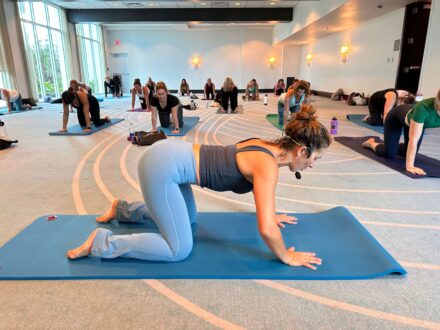By Courtney Weis
Over 25 years ago I started teaching group fitness classes. An avid Group Ex participant, one day my step class instructor asked if I was interested in teaching. I replied “Sure. Sounds like fun.” …and that’s how it began. Decades later, after teaching dozens of formats, achieving multitudes of certifications from kickboxing and barre to yoga and Pilates, managing studios and designing programs, I am still passionate about teaching groups. What started as a hobby, and as a means to getting paid to exercise while my young children were in the kids’ club, turned into a career.
Today, as Peak Pilates Senior Master Instructor, Mentor and Team Leader for FitCore™, I help other instructors build their skills to teach great group classes.
Teaching groups to move together can be a daunting task. Working with various fitness levels, exercise experiences and personalities can be a challenge. Below are a few tried-and-true tips to help you successfully teach group classes.
Teach groups as multi-level and progressive.
Every group class has various levels, even those designated beginner or advanced classes have differing fitness and experience levels within the group. Therefore, learning to teach multiple levels and how to progress is imperative to participants’ success. Multi-level teaching involves starting an exercise or sequence with an easier option and building or progressing to increased difficulty. The instructor’s role is to stay in the sweet spot in the middle. For example, cues for the exercise The Hundred might be: “Everyone begin with knees pulled to the chest.. Lift your head and pump your arms. Stay here and pull the abs in deep. This is a great place to work the Powerhouse. Do you want more?… Straighten your knees, legs over hips in Pilates stance. Connect more deeply, and if you want another challenge, lower your legs towards the mat.”
In FitCore™ Mat classes we add body-weight fitness exercises like squats and lunges and always provide multi-level options. It sounds like this: “Back lunge. Reach one leg back into a lunge position and return to the starting position, tapping your toes on the mat. Stay here, or progress to the balance challenge – lift one knee. Lunge back, knee up!”
Multi-level teaching with progression keeps all participants moving at their level and appropriate for each workout.
Exercise Name
Cue the name of the exercise FIRST. The name of the exercise alerts your participants to what comes next. When cueing the exercise “shoulder bridge,” say the name first. Students who know what a shoulder bridge is will immediately move into the position. For those who need more detail, they will listen to the instructor who then cues how to set up the exercise. “Lie supine. Legs together in parallel, Bend knees, feet to floor. Arms long to the side with palms facing the mat.” Now everyone is together, and students can move.
Educate!
Students want to learn. Educating the students on an exercise will allow them to perform with greater precision. For example, “Reach arms long to open the chest as you lower to the mat.”
This is part of the cueing system called the 5 Es of FitCore™. The 5Es is a layering of cues aimed at keeping teachers and students clear on what’s coming next so all participants can say in motion.
Pre-Designed Workouts
Teaching groups requires energy and time. Leading a class with a predesigned format allows you, the teacher, to focus on teaching rather than spending countless hours planning. It takes the guesswork out of class design, as all workouts are designed by professionals to provide a safe, effective and well-balanced workout. All FitCore™ workouts (mat, reformer, chair) are created in choreography blocks and each block has a theme or goal. For example: ab activators, side lying, and extension are some of the blocks included in mat workouts. Blocks are progressive and designed to accommodate multi-level teaching styles.
Music
Let the music move you. Music is a distinguishing factor in most group fitness classes. Traditionally Pilates does not use music. In FitCore™ we use music to build energy and excitement. Consider using music in your class to change the mood, inspire, and energize or to relax, chill, and restore. Music is an amazing way to connect with and motivate your groups.
Mirroring
Face your classes and provide mirrored movements. = It’s important to stand where you, the instructor, can always be seen. Make eye contact and face your groups. Move around the room so wherever your students are….you face them.
When you mirror movements, your groups can more easily follow you. While facing a group, when cueing to move right, you move left. Use landmarks such as directional cues like “step towards the door” or “reach your arms toward the window” to avoid confusion with right and left.
Use these tools for great group teaching to get your groups together and moving. Your participants will feel successful and keep returning for more. Most importantly….SMILE and have fun!! If you are having fun, so will your students.



